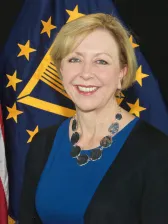Like the ripples created when a pebble is tossed into a pool, the right data made public in a room of people who care creates a positive stir. On May 10, CrunchBase, the National Venture Capital Association (NVCA) and the U.S. Small Business Administration (SBA) hosted an event in San Francisco that brought new data to light on women in venture capital to a diverse room of entrepreneurs, investors, accelerators, and organizations interested in increasing women's access to capital. Mark Walsh, Associate Administrator of the Office of Investment and Innovation and I joined SBA Administrator Maria Contreras-Sweet at the event that was organized by SBA's Office of Women's Business Ownership to generate interest among women entrepreneurs in the Small Business Investment Company (SBIC) program.
The room was full of a bunch of bottom-line oriented thinkers who were ready to hear bad news. While there's obviously a ton of room for improvement, the news was cause for optimism. The big takeaway from the CrunchBase Women in Venture report was that venture investment in companies founded by women doubled over the last six years, from nine percent in 2009 to 18 percent in 2015. Gen√© Teare, the lead author of the study, also sees an accelerating trend in women in venture capital firms. According to Teare, “for the top 100 venture firms, 38 percent have at least one female partner.”
The new data also suggest that the creation of women-founded venture firms is on the rise. In the last three years, according to CrunchBase data, 16 percent of newly launched venture and micro-venture firms -- 20 firms in all -- had at least one woman founder. Jeri Harman, founder, Managing Partner and CEO of Avante Mezzanine Partners, remembered that she had many questions when she started Avante, and that there's a need for dedicated attention to supporting emerging managers-- like bootcamps --for people interested in starting funds.
Institutional investors are increasingly showing interest in diversity, another cause for optimism. Illinois mandated a minimum percentage of pension investments through emerging managers and California, Maryland, New York and Texas are encouraging the use of emerging managers.
Jon Callaghan, founder of True Ventures and Chair of the NVCA Board of Directors, was optimistic. “There are irrational biases in our industry and the best in this business see this as an area for innovation,” said Callaghan. “It's an opportunity pure and simple, and also the right thing to do.”
SBA Administrator Contreras-Sweet underscored that investors and entrepreneurs often are too focused on the “sexy” world of VC and forget about asking the federal government. The SBIC program is arguably America's largest growth fund. It was created in 1958 to bridge the gap between entrepreneurs' need for capital and traditional sources of financing. Many in the room held SBICs or plan to apply for licenses, because for every $1 an SBIC raises from a private investor, the SBA can provide up to $3 of debt capital, subject to a cap of $150 million per fund. Once capitalized, SBICs make debt and equity investments in some of America's most promising small businesses, helping them grow.
One such person, Renée Baker, founding general partner of Pivotal Capital, did what so many know they should do. She invited a friend to the event, a successful woman VC who had no idea Baker ran an SBIC fund. There, she met others who currently run SBICs. This is the multiplier effect we can all play simply by bringing others in.
The SBA Administrator previewed some preliminary results from a Library of Congress study on diversity that includes data from the SBIC program. The study is expected to be released this summer.
The research found that compared to the private sector, SBIC funds are two to three times more likely to have women in leadership positions. Further, when women are one of the leaders in a fund, the fund is seven times more likely to invest in women entrepreneurs than a fund led by men alone. Finally, in terms of performance, women-led SBIC funds performed equally well as those led by men.
“Empowering women investors isn't some act of charity,” said SBA Administrator Contreras-Sweet in her closing remarks. “It's good business.”

